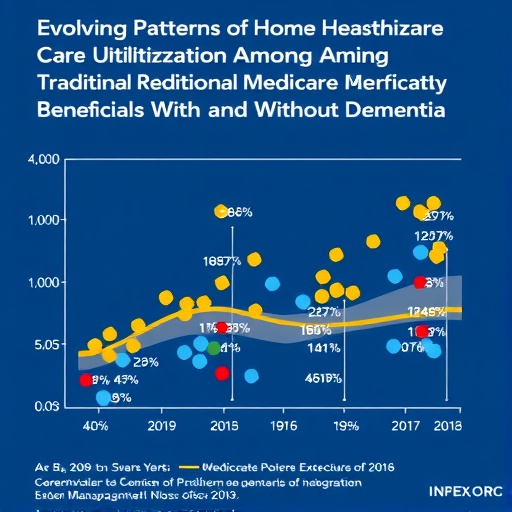A recent comprehensive study published in JAMA Network Open has shed new light on home health care utilization among individuals diagnosed with dementia. The investigation reveals a pattern of initially high and increasing rates of home health service use within this vulnerable population. However, intriguingly, these rates experienced a notable decline following 2020, signaling potential shifts in care dynamics that warrant further scrutiny by researchers and policymakers alike.
Dementia, a progressive neurological disorder characterized by cognitive decline and functional impairment, imposes substantial demands on healthcare systems and caregiving frameworks. Home health services have traditionally served as an essential support mechanism for those affected, aiming to maintain independence while managing complex medical and psychosocial needs outside institutional settings. This study’s findings emphasize that despite the known needs, service utilization trends have begun to alter in recent years, an observation with significant implications.
The research employed rigorous statistical methodologies to analyze longitudinal data sets encompassing thousands of patients diagnosed with dementia. By applying advanced statistical analyses, including time-series evaluations and regression modeling, the researchers were able to quantify changes and identify potential inflection points in home health usage patterns across the examined timeframe. Such methodological precision provides robust evidence underpinning the observed decrease starting roughly in 2020.
Several hypotheses have been posited to explain this trend reversal. Among them is the considerable disruption introduced by the COVID-19 pandemic, which may have restricted access to home health services due to infection control measures, workforce shortages, and shifting healthcare priorities. Furthermore, patient and caregiver apprehension regarding virus exposure during in-person visits may have contributed to decreased acceptance or availability of these services.
Beyond pandemic-related factors, the findings provoke critical questions about the adequacy and responsiveness of home health care systems in addressing the evolving needs of people living with dementia. The decline in service use might reflect systemic challenges, including funding constraints, workforce capacity issues, or changes in clinical guidelines affecting referrals and eligibility criteria. These dimensions require ongoing monitoring to ensure that people with dementia do not experience unintended gaps in essential care.
The study also calls attention to the necessity of innovative approaches to patient monitoring and health care delivery. Technologies such as telehealth, remote patient monitoring devices, and artificial intelligence-driven care coordination could mitigate some access barriers and optimize service provision. Embracing these advancements may be instrumental in reversing adverse trends and enhancing outcomes for this high-need population.
Importantly, this burgeoning shift in home health utilization underscores the broader demographic and healthcare landscape changes. With increasing dementia prevalence due to aging populations worldwide, a sustained decline in supportive services could exacerbate caregiver burden, heighten hospitalizations, and accelerate institutionalization rates, thereby amplifying costs and reducing quality of life.
The research team highlights the urgency of continuous data collection and analysis to inform policy decisions and healthcare planning accurately. This entails integrating diverse data sources, including electronic health records, insurance claims, and patient-reported outcomes, to build a comprehensive picture of care trajectories and service effectiveness.
From a clinical perspective, the findings suggest a need for heightened vigilance among healthcare providers to proactively assess home health needs and advocate for appropriate interventions. Tailoring care plans to accommodate individualized progression of cognitive and functional decline may enhance timely access and sustained engagement with supportive services.
Additionally, the study prompts reconsideration of health equity dimensions in service accessibility. Disparities related to socioeconomic status, geographic location, race, and ethnicity could be contributing factors in the uneven distribution of home health utilization trends. Addressing these inequities is paramount to fostering inclusive and comprehensive dementia care strategies.
Ultimately, the observed trends highlight a critical junction in dementia care, where evolving healthcare environments, patient needs, and technological potential intersect. Ensuring that home health services remain a viable, adaptable, and effective component of dementia care requires coordinated efforts among researchers, clinicians, policymakers, and community stakeholders. Ongoing vigilance and innovation will be key to meeting the challenges posed by rising dementia prevalence in a post-pandemic world.
As dementia continues to be a leading cause of disability and dependency globally, insights from studies such as this provide essential evidence for optimizing care delivery frameworks. They reinforce the importance of maintaining and enhancing supportive home-based services, which play a transformative role in preserving patient dignity, improving health outcomes, and alleviating systemic healthcare pressures.
For healthcare systems striving to adapt and thrive amidst rapid changes, this research serves as a clarion call to reassess current practices and embrace data-driven solutions. Enhanced surveillance, coupled with technological integration and policy reforms, can pave the way for more resilient, patient-centered care models tailored to the complex demands of dementia populations.
In conclusion, the decline in home health service use among people with dementia post-2020 identified by this study represents a multifaceted challenge with profound clinical, social, and economic ramifications. Addressing this trend will require sustained attention, innovative interventions, and collaborative action to ensure that vulnerable populations receive the care and support they urgently need in the years ahead.
Subject of Research: Home health care utilization trends among people with dementia.
Web References: DOI: 10.1001/jamanetworkopen.2025.10933
Keywords: Dementia, Health care, Population, Patient monitoring, Statistical analysis, Health care delivery




